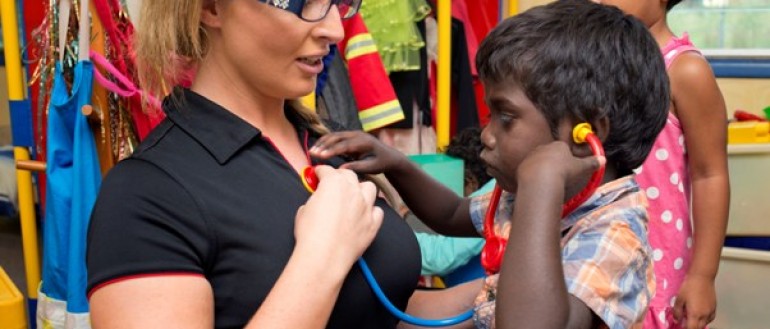Aims:
- To establish the prevalence of Rheumatic Heart Disease (RHD) in high-risk Indigenous Australian children and to compare the findings with children at low risk for RHD
- To determine the accuracy of cardiac auscultation in detecting echocardiographically- confirmed RHD.
Summary:
The gECHO (getting Every Child’s Heart Okay) study was carried out across the north of Australia between 2008 and 2010. It aimed to determine the number of Indigenous and non-Indigenous Australian children with RHD.
gECHO involved performing a heart ultrasound, called an echocardiogram (or ‘echo’), on around 5000 children aged 5-14 years. Children found to have RHD or any other possible heart abnormality were referred to local health care services. gECHO results have helped to develop more accurate criteria for diagnosis of RHD on echo and ensure that only people who really have RHD will be treated for it.
Portable echocardiography was performed on high-risk Indigenous children aged 5-15 years living in remote communities of northern and central Australia. A comparison group of low-risk, predominantly Caucasian, children living in Darwin and Cairns was also screened A subset of high-risk children from the NT also had cardiac auscultation performed by a doctor and a nurse. Echocardiograms were reported off-site in a standardised, blinded fashion.
Implications for policy and practice:
gECHO will help health policy makers decide if screening for RHD in well children who are at risk, including Indigenous children, is worthwhile.
- The children we found with RHD were referred to the clinic to start penicillin treatment
- By starting treatment early, we can prevent their RHD from getting worse
- This is the first study that shows us how many children have RHD in different communities
- We can use this information to improve services for people with RHD in northern Australia.
The prevalence of definite RHD in Indigenous children in northern Australia is comparable to that in developing countries, and approximates previous estimates from the Northern Territory (NT) RHD register. Longitudinal follow up of children with Borderline RHD will be critical to understand the natural history of this group, which will determine whether it is useful to detect these cases using echocardiographic screening.
Sensitivity and positive predictive value of cardiac auscultation compared with echocardiography is poor, regardless of the expertise of the auscultator. Cardiac auscultation should no longer be used to screen for RHD in school children in Australia.
Our research has found:
- Over 99% of children have healthy hearts
- Less than one in 100 children have RHD
- More children in remote communities had RHD than children in Darwin and Cairns.
Of 3945 high-risk children, 32 met the World Heart Federation criteria for Definite RHD (prevalence 8.1 per 1000) and 44 for Borderline RHD (prevalence 11.2 per 1000). Of 1053 low-risk children, none met criteria for Definite RHD, and 5 met criteria for Borderline RHD. High-risk children were 4.3 times more likely to have Definite or Borderline RHD than low-risk children.
Cardiac auscultation was performed on 1015 children, and missed more than 50% of RHD cases, regardless of the experience of the examiner. Over 90% of children identified with murmurs had normal echocardiograms.
Chief Investigator:
- Jonathan Carapetis (ex Menzies director)
Project Manager:
-
Kathryn Roberts
Contact information:
Project dates:
The project ran from 2008 - 2010.

